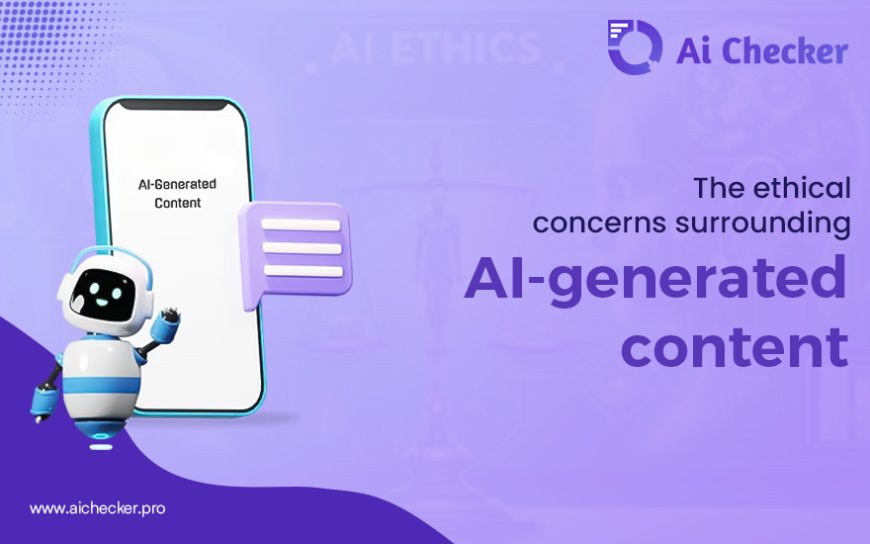What Are the Ethical Concerns Surrounding AI-Generated Content?

What Are the Ethical Concerns Surrounding AI-Generated Content?
As artificial intelligence continues to evolve, AI-generated content is becoming more prevalent across industries, from education and entertainment to marketing and journalism. While these advancements bring exciting opportunities, they also raise significant ethical concerns. Tools like AI Checkers and AI Detectors have become essential for addressing these challenges. Let’s explore the key ethical concerns surrounding AI-generated content and the role of detection technologies in mitigating them.
1. Misrepresentation and Deception
One of the primary ethical concerns is the potential for AI-generated content to mislead or deceive audiences. Whether it’s fake news articles, manipulated videos, or AI-written essays, the line between human and machine-generated content is increasingly blurred. This can result in:
- Misinformation: AI-generated text or media can spread false information, leading to public confusion and harm.
- Plagiarism: Students or professionals may misuse AI tools to produce work that they falsely claim as their own.
AI Detector play a critical role in identifying such instances, ensuring that audiences can differentiate between genuine and AI-generated content.
2. Intellectual Property Concerns
AI systems often generate content by analyzing large datasets, which may include copyrighted material. This raises questions about intellectual property rights:
- Unauthorized Use: AI-generated content might replicate or remix existing works without proper attribution.
- Ownership Issues: Determining who owns AI-generated content—the user, the developer, or the AI itself—remains a gray area.
AI Checkers can help identify potential overlaps with existing works, ensuring that intellectual property rights are respected.
3. Lack of Accountability
AI-generated content can complicate the concept of accountability:
- No Clear Author: When AI creates content, it’s unclear who should be held accountable for its ethical implications.
- Anonymous Misuse: Individuals can use AI tools to create harmful content while remaining anonymous.
AI Detectors can help trace the origins of AI-generated material, fostering greater accountability and discouraging misuse.
4. Bias and Discrimination
AI systems are only as unbiased as the data they are trained on. If the training data contains biases, the generated content may perpetuate or amplify them:
- Cultural Stereotypes: AI-generated text or images might reinforce harmful stereotypes.
- Exclusion: Certain groups may be underrepresented or misrepresented in AI-generated content.
Ethical guidelines and diverse datasets are necessary to address these issues, alongside the use of AI Checker to flag potentially biased outputs.
5. Erosion of Creativity
As AI tools become more capable of generating high-quality content, there’s a risk of over-reliance on these technologies:
- Reduced Human Effort: Individuals may rely on AI for creative tasks, diminishing opportunities for original thought and innovation.
- Generic Outputs: AI-generated content often lacks the nuance and emotional depth of human-created works.
Encouraging responsible use of AI tools and leveraging AI Detectors in educational settings can help maintain the value of human creativity.
6. Privacy and Data Security
The creation of AI-generated content often requires large amounts of user data, raising concerns about:
- Data Collection: How much personal information is being collected to train AI systems?
- Potential Misuse: Could this data be exploited for malicious purposes?
Implementing robust privacy policies and using AI Checkers to monitor data usage can mitigate these risks.
7. Transparency and Trust
AI-generated content can erode trust if its origins are not disclosed. Audiences have the right to know when they are engaging with AI-created material. Lack of transparency can lead to:
- Loss of Credibility: Organizations that use AI without disclosure may face backlash.
- Ethical Violations: Failing to disclose AI involvement may breach ethical standards.
AI Detectors help ensure transparency by identifying AI-generated content, allowing organizations to maintain trust with their audiences.
Conclusion
AI-generated content offers incredible potential but also introduces complex ethical challenges. Misrepresentation, intellectual property concerns, accountability, bias, and privacy are just some of the issues that demand attention. Tools like AI Checker Pro are essential for addressing these concerns, promoting transparency, and ensuring ethical use of AI technologies. As we navigate this evolving landscape, balancing innovation with ethical responsibility will be key to harnessing AI’s power for good.
What's Your Reaction?


















![SAP C_KYMD_01 Exam Dumps [2024 Questions] For Perfect Study](https://news.bangboxonline.com/uploads/images/202410/image_430x256_6715e66898e62.jpg)
